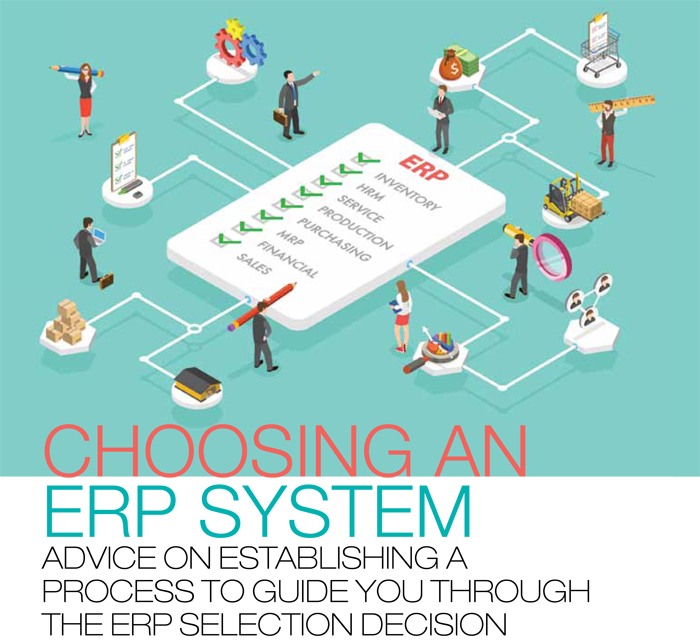Choosing an ERP System

by Rich Vurva
Few decisions are as important to a distributor as selecting the distribution software system that powers their business. The enterprise resource planning (ERP) tool is the lifeblood of a distribution company. It’s where customer contacts, purchasing history, products, SKU data, pricing and virtually every piece of information is stored. That’s why it is critical that distributors establish a detailed, well-defined plan to guide the management team through the selection process when it comes time to upgrade or replace your ERP system. We recently reached out to several technology companies to ask what kind of advice they offer to distributors. Here’s what they had to say.
 John Carrico
John Carrico
VP Product Management
Epicor
Distributors embarking on or continuing an ERP digital transformation journey might be overwhelmed with the features and choices they must consider. This is because today’s ERP systems have numerous benefits – with both on-premises and cloud options – that meet the various needs of distributors. Ongoing supply chain disruptions, inflation, fluctuating customer needs, competition with large enterprises and labor shortages are some of the main concerns we address with our ERP technology.
As the VP of Product Management at a global enterprise software company, we use industry-specific knowledge to tailor solutions to the needs of all customers. With distinct industry know-how with companies that make, move and sell (namely manufacturing, distribution and supply chain), we’ve identified six features that distributors are specifically seeking when they make an ERP selection decision:
- Efficiency and productivity tools: With labor shortages impacting all industries, business decisionmakers are always on the hunt for tools that make their lives and their employees’ lives easier. Efficiency and productivity tools allow teams of all sizes to focus their attention on what really matters – growing and scaling the business – while alleviating workload and improving employee satisfaction.
- Financial management functionality: From basic bookkeeping to advanced analytics, financial management solutions are designed to help automate and streamline financial processes while giving users greater visibility and control. Consider solutions that support industry- specific complex standards and regulatory requirements with Financial Management modules to transform the finance department so other teams can dedicate time to growing the business.
- Data analytics and reporting capabilities: Ask the question – is the company data driven or data led? Being data led is ideal in today’s technological world. Why? Companies of all sizes use data to inform decisions, but a truly data-led company has autonomy over its data. This means there is an almost-constant feedback loop of data that the company uses to make immediate decisions with because it is baked into the ERP system. Advanced data analytics and reporting capabilities empower businesses to let data lead change and take operations to the next level.
- Artificial intelligence (AI) & machine learning (ML) features: AI and ML often bubble to the top of customers’ ERP feature wish lists because of the everchanging industry landscape. Today’s uncertainty requires businesses be prepared to change prices, vendors and more to accommodate the industry at any moment in time. Integrating AI/ML features with ERP allows businesses to let data make tough decisions autonomously and accurately.
- Collaboration tools: Dreaded data silos can leave teams frustrated and out of touch with the reality of the needs and challenges of other parts of the business. Collaboration tools allow for increased visibility across the business, allowing team members and leaders alike to have a more holistic view of goals and status, and align on overarching business objectives.
- Integrated e-commerce capabilities: E-commerce is no longer just for B2C businesses – B2B customers are now diversifying offerings to meet customer demands. Given the choice of in-person, remote, and e-commerce channels, purchasers show interest in wanting them all. Over half (56%) of distributors in a 2022 survey began offering direct-to-customer-sales, demonstrating a rising trend in the industry. Customers need to be confident that their ERP partner knows their industry and understands their business. They want guidance and solutions that are curated to their specific needs, especially during the implementation and go-live phases of the journey. In fact, from Epicor’s 2022 Industry Insights research, 95% of respondents answered strongly agree or somewhat agree to the following statement: “I want to feel that my ERP solution is specific to my business.”
This means the one-size-fits-all options don’t usually meet expectations. Digital transformation journeys are just that – journeys – and businesses can feel secure during ERP implementation phases with a consistent team that supports them at every stage. From initial contact, to “on the ground” support for go-live and beyond, customers need to know they are a priority and have a partner who understands their industry’s nuances, challenges, and needs.
The distribution industry is experiencing rapid change, and many industry players are exploring technological options to better manage the new competition they are facing from disruptors. While on-premises options are available, cloud and AI capabilities stand at the forefront of the transformation since small and mid-market distributors are trying to better serve customers and be prepared for the next big disruption.
 Will Quinn
Will Quinn
Director, industry solution & strategy
Infor
Distributors should consider several factors when making an ERP selection decision. They include:
- Integration: Will my ERP seamlessly integrate with all my disparate systems to allow for a single source of the truth? (data lake)
- Automation & Data Analysis: will my ERP allow me to use automation tools like machine learning and artificial intelligence to automate processes and decisions?
- Financial Management: Will my ERP manage all facets of my business’s finances end to end, including inventory management?
- Scalability: Will the ERP grow as my business does?
- Flexibility: Will the ERP allow my business to grow, adapt and change over time?
- Reporting: Will my leaders and staff have access to the reports they need daily, weekly, monthly, quarterly, and annually, without having to spend time data mining and compiling spreadsheets?
- Modular: Will the ERP allow me to choose the features and modules needed now and in the future?
- Document Management: Are all documents associated with any given order or shipment digitally stored and readily available?
- Industry experience: Does the provider I am going to work with have experience with companies like mine?
- Cost: Will my TCO (total cost of ownership) be lower and in my budget for licenses and implementation?
It is vitally important for a distributor to work with a software provider and implementor that has industry experience. Working with a company that does not have industry experience is like asking your caterer to fix your plumbing! Distributors have specific functionality requirements that only a provider with distribution experience understands. Our in-house and partner implementors have the knowledge and expertise to complete it the first time on time and within budget.
Determine why you want to update and what the potential benefits would be. Set a clear vision of what you intend to achieve from making the change. Ensure that the benefits align with your organization’s long-term business strategy. Create and send an request for proposal (RFP) to potential vendors. Choose a partner with industry experience, a track record of successful outcomes, and whose core values align with yours. Access potential risks and create a change management strategy.
 Gina Parry
Gina Parry
Distribution & Pharmaceutical Sales Manager
VAI
Distributors are looking for ease of doing business and automation. They want their customers to be able place orders and manage their accounts with mobile and web apps. They are also looking to move away from antiquated paper pushing and get more into paperless workflows and automation. No one wants to replace their current system with more of the same thing. A new ERP must be taking advantage of new technology, offering high levels of data security and functionality.
How important is it for distributors to choose a software provider with experience in their industry vertical? For most distributors, this is not critical. If you lock yourself into a solution that only knows your specific industry vertical, you will lose the benefits of the collective knowledge of the distribution industry as a whole. It’s important that the provider have the capability to understand your vertical and apply their solutions in that space, but realistically you will get broader R&D benefiting you in ways you maybe didn’t even know you needed with a more generalized solution. Some providers, like VAI, offer the ability to add on customized features if your vertical requires it, which gives you the best of both worlds.
At the end of the day, the partnership is what will make the project successful. Once you’ve vetted the product and it largely meets your needs, the next step is to ensure that the company is one that you feel will be there to support you when you call. If the personalized service isn’t there, you will be searching for a new solution in a few years. The ideal solution is one who meets 80 percent to 90 percent of your requirements with the ability to provide the other 10 percent to 20 percent through partners, and whose company is large enough to support you and their product, but small enough to care about your success.
 Magnus Meier
Magnus Meier
Global Vice President Wholesale Distribution
SAP
When choosing an ERP system, distributors look for a comprehensive, intelligent suite of solutions. This includes core enterprise resource planning software combined with industry-specific, line of business applications that support fundamental business requirements, solve real-time business issues, and adapt to rapidly changing business challenges. Key areas include:
- Supply chain planning solutions that help manage customer demand and heightened expectations by providing business information across the network, improving real-time data analysis, and enabling better collaboration.
- Procurement solutions to manage global supply risk and volatile pricing, protect profitability, and contribute new innovations to the business.
- Supply chain execution solutions that support real-time demand, optimize freight, shipping, and warehouse operations, and provide visibility needed to make efficient logistics and order fulfillment decisions.
- Marketing and sales solutions that empower the sales force to better engage with customers throughout the buying journey and sell more from anywhere, with insights to improve sales performance.
- Service and customer solutions that deliver an omnichannel service experience with customer-specific and value-added product services that exceed customer expectations.
Two specific processes that are key to this industry are the management of vendor cost recovery and rebates, and the management of pricing processes. Both are important in this industry where controlling margin is critical, and are a decision point for many companies.
It is very important to choose a software provider that not only understands the distribution industry and its segments, but also has an ongoing commitment to the industry. These companies promote continuous customer feedback into solution strategy and planning and develop collaboration and participation with industry-leading wholesale
distribution companies. With this knowledge, they can deliver best practices and capabilities that support differentiating processes in the industry with minimal effort, cost, and risk. Leading software providers also have a strong partner ecosystem with qualified, industry-focused partners that support rapid and cost-effective installation and implementation.
There will always be new challenges in the industry, so distributors should look for systems and software providers that can adapt with them. To avoid disruption and remain relevant, every enterprise will need to develop new business models to gain efficiencies, support innovation, and transform critical processes without business risk. They should implement a comprehensive solution that supports industry next practices and will support the business into the future.
This article originally appeared in the Nov./Dec. 2022 issue of Industrial Supply magazine. Copyright 2022, Direct Business Media.













